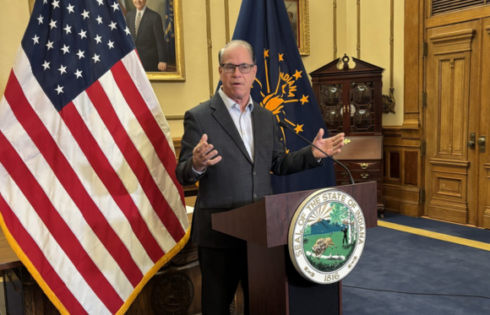
Don’t identify a suspect’s race, it’s insensitive?
Campus authorities across the country have basically encouraged students to report the slightest offense or emotional feeling of being unsafe.
But what happens when one of them reports a potential physical threat that turns out to be benign?
At Colgate University, if the alleged threat is a black person, the student who reports it could face sensitivity training, and maybe worse.
The private school in upstate New York jumped the gun, so to speak, when it sent a campus alert about an “emergency” and then sent another that incorrectly stated there was an “active shooter on campus,” sending the campus into lockdown for several hours.
What prompted this bungled response was a student who called the campus-safety office to say a “black student” was seen carrying what appeared to be a gun, according to The Chronicle of Higher Education.
MORE: College shows ‘implicit bias toward white life’ by mourning Paris attack
The alert that students received when the emergency situation was “resolved” did not mention race:
At approximately 8:00 p.m. this evening (May 1), an individual entered the O’Connor Campus Center while carrying what witnesses believed was a weapon. Campus Safety initiated a campus lockdown in response to these reports. After thorough investigation, and with the assistance of the person in question, law enforcement identified the individual as a student who was using a glue gun for an art project, confirmed the misunderstanding, and released the campus from lockdown.
A black student, a glue gun and a lockdown prompt debate over race at Colgate https://t.co/jMA8q1AZps pic.twitter.com/TkxGCf7vXq
— Larry Ferlazzo (@Larryferlazzo) May 3, 2017
Colgate President Brian Casey wrote to the community Tuesday that he has asked the campus safety director, Bill Ferguson, to take administrative leave. He said he was talking with “those who were making the essential administrative decisions last night.”
All well and good.
Then the president of the university called a student who was likely acting out of concern for the physical safety of fellow students a racist.
Read his choice of words carefully:
It is important that we understand the role that implicit racial bias had in the initial reporting of and responses to the events of last night. I want to make sure we speak with those who made and received the initial report to understand the role this played.
The student who confused a glue gun for a weapon – probably because the black student was entering a building from outside where it would be dark – is guilty of “implicit racial bias.”
The administration will “speak with those who made” the report “to understand the role” of implicit racial bias. Has anyone been called into an administrator’s office to discuss her perceived racism and not expected negative results?
MORE: Colleges require scholars pledge commitment to diversity
Casey’s next statement suggests it was the reporting student’s fault that his own staff created a groundless active-shooter panic:
More egregiously, perhaps, was the effect profiling had on the response of safety officers and other University offices to these events.
Officers apparently knew two things about the suspect: The student was a black male who was carrying something that looked like a weapon. That came directly from the student tipster. Officers didn’t “profile” anyone.
President Casey is calling a student who reported a potential physical threat a racial profiler. His language suggests the student could be disciplined or forced to undergo sensitivity or implicit-bias training.
So much for “see something, say something.”
What about white women accusing black males of rape?
Casey’s response is diametrically at odds with how colleges typically treat another potential crime – sexual misconduct.
Consider a hypothetical scenario that is all too real, if you take seriously the congressional testimony of Harvard Law Prof. Janet Halley.
Sharing her experience at Stanford and Harvard assisting both accusers and accused students in campus sexual-assault proceedings, and serving on adjudication panels, Halley said this:
In my experience, the rate of complaints and sanctions against male (including transitioning to male) students of color is unreasonably high. … Providing scant due process for these particularly vulnerable groups of accused students runs the very real risk that innocent students are being held responsible, sanctioned, and given tainted records that will haunt them for years.
MORE: Mentioning race in crime alerts ‘threatens’ black students’ safety
Her Harvard colleague Nancy Gertner, a former federal judge and litigator on behalf of rape victims, has also highlighted “the racial implications of rape accusations, the complex intersection of bias, stereotyping, and sex in the prosecution of this crime,” in an article in the liberal magazine The American Prospect.
Imagine now that a white woman reported a black man to Colgate for raping her.
Untangling campus rape from a drunken hookup, or a change in feelings after a consensual sexual encounter, is a tall order. It’s not the difference between a glue gun and a deadly weapon. It’s often the difference between “I felt this way” and “I felt that way,” as perceived after sobering up or breaking up.
Suppose that somehow Colgate determined there was no merit to the claim, which already strains credulity, given the federal pressure on colleges to judge male students guilty from the start.
Can you imagine Colgate sending a campus alert accusing the reporting student of “implicit racial bias” for accusing a black man of rape? Can you imagine Colgate saying anything remotely negative about that student, even without identifying her, whose accusation could have doomed the accused student’s life, relationships and career?
Of course not. It would find itself the subject of multiple reports to the feds for Title IX violations – creating a hostile educational environment for rape victims by dissuading them from coming forward.
Students whose sexual-misconduct claims are judged to be without merit – good luck getting any administrator to say they were “false” – never face consequences in a campus setting that does not penalize premarital sexual activity, and even there it’s becoming rare.
I’ve asked Colgate what specific action it’s taking with regard to the student who made the incorrect report, as well as that student’s race, since President Casey accused that person of racial bias.
I’m expecting the university to say that it can’t turn over any specific information because of the Family Educational Rights and Privacy Act, which is plainly false.
Two things are clear: It’s safe to falsely accuse a black man of rape at almost any campus, including Colgate. It’s not safe to report a potential weapon at Colgate if the subject is black.
MORE: University settles with employee who objected to race descriptors
Like The College Fix on Facebook / Follow us on Twitter
IMAGES: Shutterstock, Beacon Press







Please join the conversation about our stories on Facebook, Twitter, Instagram, Reddit, MeWe, Rumble, Gab, Minds and Gettr.